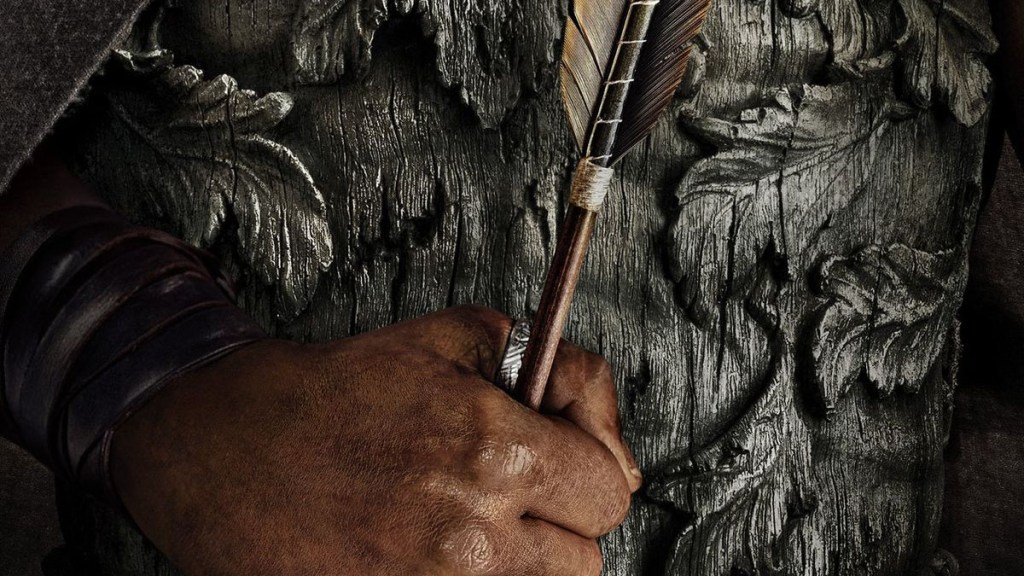Lord of the Rings: The Rings of Power – Why Fandom Has To Embrace Change
Intransigent and reactionary fandom is nothing new, but some responses to the Lord of the Rings: The Rings of Power trailer show how damaged the culture has become.

In response to the trailer for Amazon’s new Lord of the Rings series, there has been a negative reaction based on the fact that not everyone in the series is a white man. Sure, there have been other negative reactions too, but they’ve been trampled by review bombing rage. In particular, a lot of people have been posting a quote attributed to Tolkien to highlight their disgust: “Evil is not able to create anything new, it can only distort and destroy what has been invented or made by the forces of good.”*
Which is, frankly, colossally lacking in self-awareness.
The Rings of Power is an adaptation of the written word into a visual medium made in the third decade of the 21st century. It is not going to match books written in the middle of the 20th century in the same way as Peter Jackson’s films do not match the books. Adaptations are affected by the change in medium and the context creative decisions are made in. They do not alter the original text, and often increase its availability.
Twenty years ago, there was a similar backlash – including from a teenage me – when Jackson’s films made Arwen a more prominent character than in the books. Looking back, I realize my objections were based on ignorance (of Tolkien’s Appendices, and of the adaptation process in general), unexamined sexism, and entitlement.
Fan reactions have undoubtedly become more extreme since Jackson’s Lord of the Rings film trilogy was released, and they started off aggressive. The positives that can come with fandom (community, connections, creativity…) don’t counteract its negative sides. Ignoring the increasingly destructive elements with a kind of toxic positivity amounts to a suspension of critical engagement and an unwillingness to process difficult truths.

There’s a sense of a fan’s identity being tied up in something make-believe, making a criticism of their favourite stories a criticism of them as people. For example, despite Tolkien’s vehement anti-racism there are issues with his mythology (his equating the Dwarves with Jews – including linguistically – was intended positively as a representation of dispossessed people but he also described their “tremendous love of the artifact” in a 1965 BBC interview, which is a common antisemitic trope). Some people regard pointing this out as a personal attack, an attempt to stop them from enjoying something they love. As with fandom, ignoring the negatives of something doesn’t stop them from being present.
This sense of fan ownership and attachment isn’t a new phenomenon. In 1893 20,000 readers of The Strand magazine cancelled their subscription upon the death of Sherlock Holmes. In 1980 both critics and Star Wars fans expressed dissatisfaction with The Empire Strikes Back because it changed what had been established in the previous film. The difference here is that these responses weren’t connected to a burgeoning right-wing movement, which is where we find ourselves today.
Lord of the Rings has already been co-opted by the far right. Despite Tolkien being on record as hating apartheid, “British and American imperialism in the far east,” raging against Nazis and their interpretation of his work as an Aryan allegory (he was asked by German publishers in 1938 if they could translate The Hobbit, but Tolkien was told this was conditional on his proving he had Aryan blood and no Jewish ancestry – his reply was withering), this has continued to be the case. In 1970’s Italy there were Hobbit summer camps run by a burgeoning right-wing movement who marketed themselves as ‘not your father’s fascists.’ A sense of traditionalism, of restoring the apparently glorious past, drove them and connected them to Tolkien’s work (and unfortunately for Tolkien there are parallels to be made). Fans of Tolkien include Gianluca Casseri and Anders Breivik (both racially motivated murderers), Varg Vikernes (a black metal musician, murderer, anti-Semite and “Scientific Racist” – i.e. someone who misapplies science to support their racism).
Given its previous connections with fascism and the response to Peter Jackson’s films, it’s sadly not surprising to see Lord of the Rings fandom engaging in culture war campaigns. Since at least 2014 and Gamergate, there has been momentum that has built through different fandoms. There was overlap between Gamergate and the Sad/Rabid Puppies voting campaigns at the Hugo Awards of 2015 and 2016. Though Gamergate was chaotic and unfocussed in comparison, both groups were united by their hatred for media with a progressive political message and a perceived bias toward non-white-male creators. There was also a sense that they were losing control of “their” genres, with gaming, science fiction, and fantasy being no longer seen as uniquely appealing to straight white men.

This feeling further solidified around the 2016 Ghostbusters reboot, a film that established a new continuity with female leads rather than revisiting old characters (due largely to Bill Murray’s reluctance to film any of the proposed sequels at this point). Before the film’s release there was a coordinated effort to harm its marketing and internet presence by downvoting trailers and listings. Leslie Jones left Twitter due to the racist and sexist abuse she received. Critics could point to dissatisfaction with reboots of popular properties (certainly the 2012 Total Recall 2014 Robocop took a lot of flack), but it’s noticeable how much this ramped up when the leads of the film weren’t white men.
The recent Star Wars trilogy also had similar campaigns waged against it. The Force Awakens was criticized for Rey, the new lead, being a Mary Sue (which resulted in a response suggesting double standards for female leads and male leads). Kelly Marie Tran was also abused on social media for simply being in a film after playing Rose in The Last Jedi. John Boyega received racist abuse and death threats ever since his role as Finn was announced (stormtroopers can adjust the accuracy of their shooting to suit the demands of the scene but they can’t be Black, apparently), with Disney failing to support him until after the trilogy had been released (said support was also merely a tweet).
The Last Jedi also provoked an extreme fan reaction, and more review bombings where coordinated efforts were made to lower its rating on websites like Rotten Tomatoes and IMDb. Interestingly, bringing things back to the quote that’s being used to spam the new Lord of the Rings series (“Evil is not able to create anything new, it can only distort and destroy what has been invented or made by the forces of good” for those of you who don’t want to scroll back up). Looking back over this potted history of entitled fan reactions, a recurring theme is a desire to keep things the same and avoid breaking new ground: Gamergate didn’t want the perception of fandom to change, for games to change; the Sick Puppies wanted science fiction and fantasy to remain static, and right-wing Tolkien fans are harking back to a mythic version of the past because they don’t like the present. We see this desire to see the same people’s stories in Ghostbusters and Star Wars rather than take the series somewhere different, be it through the eyes of new people or to new planets. That this quote is being used would be a massive self-own if it weren’t for the fact that this requires self-awareness.
These responses are destroying the ability to converse about art. It’s becoming harder to have a discussion with the constant thrumming discourse permeating every exchange. Merely mentioning the 2016 Ghostbusters film means the inevitable arrival, nearly six years on, of someone to aggressively dismiss it. You’d think, having got a new film in the original continuity, that response might calm down a bit, but if such behavior has got them what they wanted, then why would they stop there?
The tactics of spamming and overwhelming conversation have been in place for some time now, and we should stop pretending that everything’s fine just because fandom has the odd cute story about someone crocheting a Rancor beast. There is a significant portion of fandom who are not in a position to be reasoned with. Report them, block them, move on. They cannot create anything new, only distort and destroy what we already have.
*This article was amended to reflect that the quote in question appears to come from the TV Tropes website rather than Tolkien himself.
Lord of the Rings: The Rings of Power arrives on Prime Video on September 2nd.
